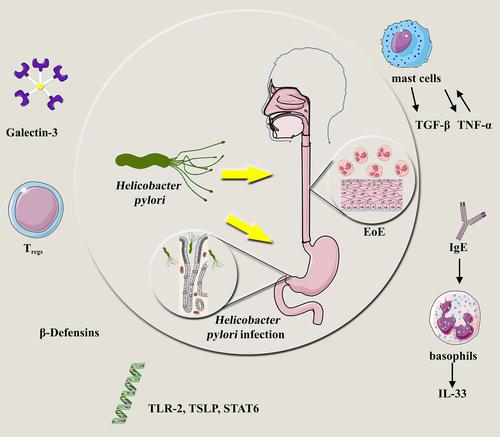当前位置:
X-MOL 学术
›
Ann. N. Y. Acad. Sci.
›
论文详情
Our official English website, www.x-mol.net, welcomes your
feedback! (Note: you will need to create a separate account there.)
Reconsidering the “protective” hypothesis of Helicobacter pylori infection in eosinophilic esophagitis
Annals of the New York Academy of Sciences ( IF 4.1 ) Pub Date : 2020-08-07 , DOI: 10.1111/nyas.14449 Michael Doulberis 1, 2 , Jannis Kountouras 2 , Gerhard Rogler 1
Annals of the New York Academy of Sciences ( IF 4.1 ) Pub Date : 2020-08-07 , DOI: 10.1111/nyas.14449 Michael Doulberis 1, 2 , Jannis Kountouras 2 , Gerhard Rogler 1
Affiliation

|
Since its discovery, Helicobacter pylori (H. pylori) has attracted attention in the biomedical world with its numerous pathophysiologic implications, both gastrointestinal and systemic. Beyond its well‐established carcinogenic properties, emerging evidence also supports “harmful” proinflammatory and neurodegenerative roles of H. pylori. On the other hand, H. pylori infection has been proposed to be “protective” against several diseases, such as asthma and gastroesophageal reflux disease. Eosinophilic esophagitis (EoE) is a relatively new, allergen/immune–mediated disease, which has also been linked to these considerations. Main arguments are a postulated shift of immune responses by H. pylori from T helper 2 (TH2) to TH1 polarization, as well as a potential decline of the H. pylori burden with the dramatic parallel rise of ΕοΕ: a series of observational studies reported an inverse association. In this review, we counter these arguments by providing further epidemiological data, which point out that this generalization might be rather incomplete. We also discuss the limitations of the existing studies evaluating a possible association. Furthermore, we provide current evidence on common pathogenetic components, which share both entities. In summary, the claim that H. pylori is protective against EoE is rather incomplete, and further mechanistic studies are necessary to elucidate a possible association.
中文翻译:

重新思考嗜酸性粒细胞性食管炎幽门螺杆菌感染的“保护性”假说
自发现以来,幽门螺杆菌 (H. pylori) 因其在胃肠道和全身的多种病理生理学意义而引起了生物医学界的关注。除了其公认的致癌特性之外,新出现的证据还支持幽门螺杆菌的“有害”促炎和神经退行性作用。另一方面,已提出幽门螺杆菌感染对多种疾病(例如哮喘和胃食管反流病)具有“保护作用”。嗜酸性粒细胞性食管炎 (EoE) 是一种相对较新的过敏原/免疫介导的疾病,这也与这些考虑有关。主要论点是假设幽门螺杆菌的免疫反应从 T 辅助细胞 2 (TH2) 转变为 TH1 极化,以及幽门螺杆菌负担的潜在下降与 EOE 的急剧平行上升:一系列观察性研究报告了负相关。在这篇综述中,我们通过提供进一步的流行病学数据来反驳这些论点,这些数据指出这种概括可能相当不完整。我们还讨论了评估可能关联的现有研究的局限性。此外,我们提供了共享两个实体的常见致病成分的当前证据。总之,关于幽门螺杆菌对 EoE 具有保护作用的说法是相当不完整的,需要进一步的机制研究来阐明可能的关联。我们还讨论了评估可能关联的现有研究的局限性。此外,我们提供了关于共同致病成分的当前证据,这些成分共享两个实体。总之,关于幽门螺杆菌对 EoE 具有保护作用的说法是相当不完整的,需要进一步的机制研究来阐明可能的关联。我们还讨论了评估可能关联的现有研究的局限性。此外,我们提供了共享两个实体的常见致病成分的当前证据。总之,关于幽门螺杆菌对 EoE 具有保护作用的说法是相当不完整的,需要进一步的机制研究来阐明可能的关联。
更新日期:2020-08-07
中文翻译:

重新思考嗜酸性粒细胞性食管炎幽门螺杆菌感染的“保护性”假说
自发现以来,幽门螺杆菌 (H. pylori) 因其在胃肠道和全身的多种病理生理学意义而引起了生物医学界的关注。除了其公认的致癌特性之外,新出现的证据还支持幽门螺杆菌的“有害”促炎和神经退行性作用。另一方面,已提出幽门螺杆菌感染对多种疾病(例如哮喘和胃食管反流病)具有“保护作用”。嗜酸性粒细胞性食管炎 (EoE) 是一种相对较新的过敏原/免疫介导的疾病,这也与这些考虑有关。主要论点是假设幽门螺杆菌的免疫反应从 T 辅助细胞 2 (TH2) 转变为 TH1 极化,以及幽门螺杆菌负担的潜在下降与 EOE 的急剧平行上升:一系列观察性研究报告了负相关。在这篇综述中,我们通过提供进一步的流行病学数据来反驳这些论点,这些数据指出这种概括可能相当不完整。我们还讨论了评估可能关联的现有研究的局限性。此外,我们提供了共享两个实体的常见致病成分的当前证据。总之,关于幽门螺杆菌对 EoE 具有保护作用的说法是相当不完整的,需要进一步的机制研究来阐明可能的关联。我们还讨论了评估可能关联的现有研究的局限性。此外,我们提供了关于共同致病成分的当前证据,这些成分共享两个实体。总之,关于幽门螺杆菌对 EoE 具有保护作用的说法是相当不完整的,需要进一步的机制研究来阐明可能的关联。我们还讨论了评估可能关联的现有研究的局限性。此外,我们提供了共享两个实体的常见致病成分的当前证据。总之,关于幽门螺杆菌对 EoE 具有保护作用的说法是相当不完整的,需要进一步的机制研究来阐明可能的关联。









































 京公网安备 11010802027423号
京公网安备 11010802027423号